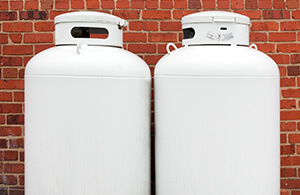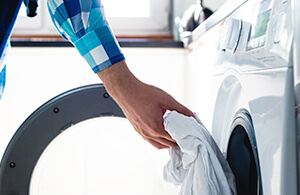Propane is one of the most popular heating and home fuels in the country. It is a smart environmental choice and it can positively impact your annual heating budget. However, if you’re buying a home that uses propane, there are some important questions that you need to ask, and get the answers to, before finalizing the sale or moving in, particularly if you’ve lived in a home fueled by oil, natural gas or electricity.
Use this checklist to get the answers you need to some very important questions.
Location of the propane tank

- Above ground tanks provide easier access and maintenance.
- Underground tanks provide a better home aesthetic as they are hidden, are protected from damage, the elements and provide more yard space.
- Always ask about the location of the home’s natural gas lines to make sure that you avoid them in any future renovations. Also, ensure that the lines are protected to avoid a potential leak and costly repairs.
Propane tank size and capacity
- Obviously, a larger tank means you refill it less. Knowing the size of the tank is also important if the home’s appliances are not all fueled by propane, and you would like to upgrade them in the future. You need to be sure that the size of the tank has the capacity to handle the extra usage.
- Also think about the current homeowner’s usage and about how your family will match up. Having a larger family means increased energy usage, so you need to be sure that you have a propane tank with the capacity to handle that. If not, you’re more likely to run of fuel! Unsure of what your usage might be? You can always check with the propane supplier who can help you work out an estimate.
Propane usage in the home
- Propane is normally used to heat a home, but it also can be used as a power source for appliances like water heaters, dryers, stoves, fireplaces and backup generators.
- However, even if a home is equipped with propane, it also doesn’t mean that it is being used throughout the home fueling the items detailed above.
- You need to know how the propane is used, and for what equipment, throughout your home to figure out annual usage and for any potential appliance upgrades in the years ahead.
Ownership of the propane tank

The propane tank can be owned either by the homeowner or leased from the propane provider.
- If it is owned by the homeowner, buying a new propane tank can be a big investment upfront. But even if you do have to buy, or there is an existing tank along with the home you’re buying, it should be reflected in the home’s price. Owning your own tank will help you save on monthly rental fees and it gives you the freedom to pick your own propane company.
- If the tank is leased from your propane provider, it will help you save on repair and potential replacement costs. You also have no need to be concerned with managing your tank and fuel needs. You should ask the person selling the home about their current propane supplier and about the process of transferring the lease before you enter into a contract. Sometimes, you may still be able to choose your own propane supplier with a leased tank but changing suppliers will require a few more steps.
Maintenance history of the propane tank - A propane tank and gas lines require regular maintenance and inspection to work properly and have a long working life. The appliances running on propane also need routine maintenance. Always make sure to ask for these records before purchasing a home. Missing records may indicate a lack of maintenance.
- If records are incomplete or unavailable, make sure to have the tank inspected by an expert before moving forward. It’s always smart to have an inspection done before buying a home powered by propane.
Don’t forget, Patriot Propane is here to help with any of your propane services and needs. If you’re buying a home powered by propane, call 1.844.820.2385 today with any questions and to learn how we can help you.
